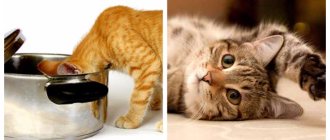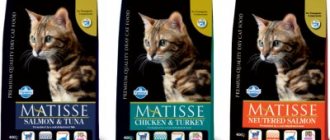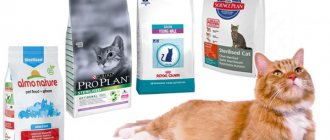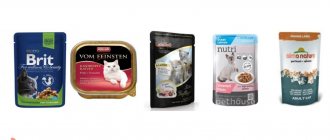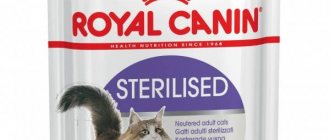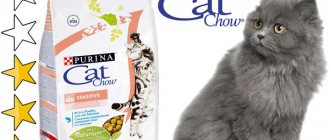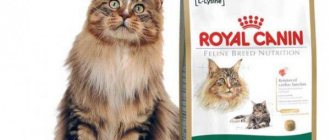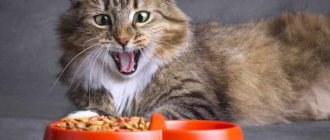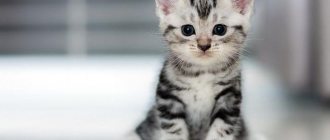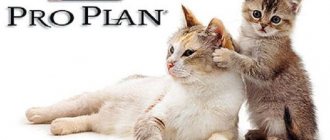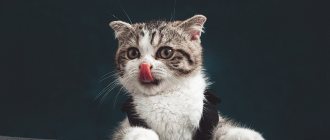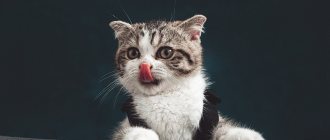After castration and sterilization, male cats become calm and affectionate. They do not mark territory, do not look for a partner for mating, and do not experience stress from the inability to satisfy their sexual instinct. For animals to be healthy, they must eat properly. The question arises: what is the difference between food for sterilized cats and regular food? When preparing a diet, veterinary nutritionists take into account the level of physical activity, metabolic rate and the needs of the animal whose gonads have been removed.
What about “straight”?
What to do if before the operation the animal got used to “natural food”?
In this case, is there a need to transfer a castrated cat to specialized industrial food - or is it enough to control portion sizes and, perhaps, adjust the menu as a whole? This is an important point, especially considering the fact that high-quality cat food can hit your wallet much harder than purchasing some ordinary products with a four-legged family member in mind.
Another advantage of natural homemade food, besides the savings, is that you always know exactly what you are giving your cat and have complete control over its nutrition in terms of quality and freshness. There is, in essence, only one minus - “natural” requires some trouble.
Natural food for sterilized cats is not contraindicated, but on the contrary, it is recommended - subject to the general rules of nutrition. That is, do not add salt or season with “human” spices; if meat or fish - then low-fat varieties and cuts; if dairy products - then, again, with low fat content; don’t forget about carbohydrates and fiber - it can be fresh grass, or it can be cereals in the form of porridges (except semolina and oatmeal).
Protein
We will never tire of repeating: the basis of the diet of any predator should be animal proteins. The better the protein source, the better the food. High-quality or low-quality protein? Of course, high quality! It is better absorbed. The idea of low protein quality may be suggested by a vague indication of animal protein components in the diet.
But another question: quality or quantity? What to do with food that has a lot of protein, but is of low quality? You should think about whether you should give such a product to your animal. It may be worth considering another food, where the top five includes several decent meat, fish or poultry products. It is especially good if the manufacturer indicated their share in the product on the label.
You can also read about the quality and digestibility of protein here.
What are the features of the diet of sterilized cats?
Sterilization removes the glands that produce most sex hormones. Even if a cat has already given birth, its body undergoes radical restructuring. Due to a different hormonal background, serious changes occur:
- Metabolism slows down, the speed of metabolic processes decreases. Cats move less, play less actively and sleep more. Therefore, they do not consume as much energy as before - about 25% less. If they are given the same high-calorie food, pets gain excess weight, which causes diseases of the heart, blood vessels, and musculoskeletal system and reduces the cat’s life expectancy.
- The level of stress caused by the instinct to search for a partner is reduced. The production of estrogen and testosterone decreases, but the amount of procalite hormone increases. For cats, this results in an increase in appetite. Combined with decreased energy needs, this further increases the risk of obesity. Therefore, ready-made food for sterilized cats contains fewer calories than standard diets.
- The processes of urine formation and separation slow down, and its acidity increases. Cats generally do not tend to feel thirsty, and the number of urinations in healthy animals is small. After sterilization it becomes even smaller. This can lead to the formation of salts and hard stones in the kidneys and excretory tract. Due to fluid stagnation, the risk of developing urolithiasis increases. It is taken into account when selecting a vitamin-mineral complex for feed.
What changes after sterilization/castration
The operation leads to changes in hormonal levels in cats. In females, the production of estrogens, hormones responsible for sexual desire, fertilization and saturation with food, stops. For this reason, the animal begins to overeat, which leads to obesity, diabetes, urolithiasis (KD), and heart problems.
In sterilized cats, due to the removal of the gonads, testosterone disappears, which manifests itself in a decrease in sexual desire and deterioration in the absorption of nutrients. If you do not pay attention to proper nutrition, the animal will quickly gain weight after surgery, and it will have an increased risk of developing cystitis, diabetes, and kidney problems.
Important
:
The sterilization procedure itself does not harm the animal, rather the opposite. The risk of cancer is reduced, the pet becomes calmer, and is not tormented by hormonal surges. BUT sterilization requires a revision of the diet. If this is not taken into account, problems may arise.
Ready food
It is better for the owner to weigh the financial possibilities in advance and decide on the brand. It is unacceptable to give holistics first, and then a week later switch to Whiskas from the nearest supermarket.
Veterinarians recommend not paying attention to advertising slogans, but carefully reading the description on the packaging.
High-quality food has the following characteristics:
- The components are listed in detail in descending order, with meat coming first.
- The names of the ingredients can be understood by a person without special education.
- There are no dyes or flavoring additives; the shorter the list of ingredients, the better.
The daily dosage is indicated on the package; the lower it is, the more nutritious the product. This is important for dry food: cats do not like water, and they need 3 times more water than what they eat.
The composition contains L-carnitine and L-lysine: the first component accelerates metabolism, stimulates fat burning, the second maintains muscle mass.
You can make sure that your choice is correct after 2–3 weeks by looking at the pet’s appearance and well-being. The food is suitable if she has a smooth and shiny coat, normal digestion, regular bowel movements, and a moderately well-fed body.
When is food suitable for your pet?
You can tell that the food is ideal for your cat by its behavior and appearance. The animal must eat with appetite. With a properly selected diet, the fur looks shiny and well-groomed. The tufts of fur do not fall out. The pet has regular bowel movements, no stomach upset or constipation. The animal is in good physical shape.
If you feed the animal only natural food after sterilization, the animal will not receive all the nutrients beneficial to the body. By choosing a high-quality, balanced food, it will not be difficult to provide proper care for your pet. You should also not forget that the animal drinks enough liquid per day, as this is very important for its well-being.
Tweet
Join us in social networks:
How to feed pets during the rehabilitation period after surgery
After surgery, pets are weakened and need special care, including gentle nutrition. For 5–7 days after castration, you can feed cats the following foods:
- low-fat dairy products: milk, yogurt, cottage cheese;
- infant formula;
- broth from dietary meats without salt;
- boiled egg.
It is prohibited to feed animals with products containing coarse fiber; fatty, salty and spicy foods.
Cats can be switched to specialized food 1–3 weeks after surgery. Your veterinarian should provide more detailed instructions.
Be responsible when choosing food for your pet after castration. If you cannot choose the right diet on your own, be sure to seek help from a specialist.
Change in behavior of a sterilized cat
To understand the importance of purchasing specialized food, you need to monitor what happens to the animal’s body after castration.
So, first of all, it loses its activity. The pet is now less playful and more calm. Physiological changes are not long in coming. The animal's blood hormonal composition changes, and interest in the opposite sex disappears. But your appetite is growing, so if you don’t change your diet, obesity may begin very soon.
Standard formulations can lead to the development of a number of dangerous diseases:
- urolithiasis. If a castrated cat receives too much trace elements such as magnesium, phosphorus or calcium, this can lead to the appearance of stones in the urinary system. In specialized feeds these substances are contained in the required quantities, which are absorbed by the body;
- obesity. The cat cannot control the amount of food it eats, so you must control its calorie content;
- diabetes Obesity in an advanced stage can lead to more serious consequences.
How does a cat's body change after castration?
Removal of reproductive organs from cats is called castration. After surgery, animals experience the following processes in the body:
- hormone production decreases;
- the metabolism of fats, proteins and carbohydrates slows down;
- the intensity of urination decreases.
These factors increase the likelihood of developing certain diseases:
Obesity in a cat is dangerous because it can provoke serious diseases: cardiovascular pathologies, type II diabetes, dysfunction of the musculoskeletal system.
Why do you need special food?
Cats and cats are obligate carnivores. In nature, they eat insects, small birds and rodents. The victims' stomachs contain small amounts of fruit, vegetables, grains or grass. Therefore, the diet of cats and cats consists not only of meat.
The main nutrient is animal protein. However, the diet should also contain carbohydrates, fiber, and fats. At home, pets are unlikely to eat cranberries, apples or oats. And in the feed these components are present in the required quantities.
Spaying and neutering increases the risk of obesity, urolithiasis and diabetes.
Specialized nutrition can prevent these diseases. The food for castrates contains a moderate amount of fat (10-12%), so the animal is less at risk of gaining excess weight.
Special food is needed to prevent stones, crystals and sand in the bladder. It contains sodium, which helps cats and kittens consume more fluid.
The amount of magnesium, phosphorus and calcium is reduced. However, the main thing is their correct ratio. This is why industrial diets have been developed. The owner does not need to worry that his pet will not receive enough vitamins and minerals, while other substances will enter the body in excess.
The diet for adults is different from the diet for kittens, even if both are spayed or neutered. Pets under 1 year of age are given kitten food. It contains more vitamins and minerals. This can be harmful to adult animals. Therefore, food for castrates can be given only after reaching 12 months.
Which food is better: dry or wet?
Castrated cats can eat both wet and dry food. Pros of wet food:
- contain a lot of moisture, so they are easy to digest;
- Suitable for teenage kittens during the period of teeth change.
Dry food also has certain advantages:
- clean the animal’s teeth from plaque, thereby preventing dental problems;
- help strengthen the jaw muscles.
If the animal drinks little, then preference should be given to wet food. If the cat mainly eats dry food, then it needs to be slightly soaked before use.
To choose the right food for a neutered cat, you should consult a veterinarian.
Economy class brands
Some owners prefer to buy dry food for castrated cats from the economy line. An undoubted advantage of such food is that it saves money, since the price of, for example, holistic or super-premium food is much higher. However, most veterinarians agree that you should not feed your cat such foods.
The manufacturer does not add any meat or offal to the composition. As a result, the animal consumes only carbohydrates, chemical additives, flavor enhancers, and preservatives. In addition, cheap food is unable to quickly saturate the animal’s body. As a result, the kitten eats much more, which ultimately leads to excess weight gain. Advertised brands of economy class food:
Economy class goods are affordable, for example, Whiskas is popular.
- Whiskeys;
- Friskies;
- Kitekat;
- Darling;
- Tom Cat;
- Perfect Fit.
About feed classification
When choosing food, you need to remember one rule: food is different. This means that not every food sold in pet stores can be purchased for your pet.
It is customary to divide feed into several types: economy, premium and super premium feed. There are also “holistic” foods, which are considered the best among industrial food for cats (but there are some nuances that must be taken into account when choosing them).
It is strictly forbidden to feed an animal with economy-class food, since it is made from low-quality raw materials and can cause enormous harm to the cat’s health. Such food is very cheap, so it attracts consumers. However, we repeat: if you do not want to kill your beloved cat, under no circumstances feed it such dubious “food”.
Premium food belongs to the middle segment. The ideal option for feeding a cat is super premium food. Many are put off by the cost of such food, which starts at about a thousand rubles for 2 kilograms of dry food (the information is current for 2021; some excellent food is sold even cheaper). Due to the supposedly high price, cat owners prefer to buy economy-class food, which is cheaper.
However, there is one interesting thing here that proves to us that, in fact, super-premium food is not much more expensive than economical options. An important quality of feed is its digestibility, which is at a completely different level for cheap and expensive feeds. If a cat eats one serving of economy-class food, it will digest approximately only thirty percent of everything eaten, the rest will be excreted from the body under natural conditions.
However, when consuming super-premium food, the digestibility will be seventy percent, and only thirty percent of what is eaten will go to waste. It follows from this that a cat will eat much less high-quality food than cheap food, which will only satiate it by thirty percent, which means that you will have to buy more economy-class food than a super-premium product.
It’s worth remembering here that cats like to be fed not only economy-class dry food, but also wet food of the same category. Pastes and canned food are also prepared from questionable ingredients that are unlikely to benefit the cat’s body. Many owners say that their cat constantly asks for wet food, so they have to regularly buy bags. This happens because they have little nutritional value; in other words, they are poorly digestible due to low-quality ingredients used in production. The meat in such wet food made the cat cry. In addition, flavor enhancers are added to cheap canned food and pates, which makes the cat constantly want to eat. This is done in order to increase the scale of product sales.
Really high-quality canned food, which consists mainly of meat, cannot cost twenty rubles. Their cost starts from seventy rubles for a jar of one hundred grams. There are lines of complete canned food that can be fed constantly, but such feeding will be very expensive, given the high cost of a small jar. For this reason, cats are rarely fed wet food alone. The best option is feeding high-quality super-premium dry food and sometimes wet food as a treat.
Natural nutrition
Sterilization is an operation to remove the ovaries. After the procedure, the production of sex hormones ceases, which entails physiological and behavioral changes in the cat with undesirable consequences:
- appetite increases;
- motor activity decreases;
- metabolism slows down;
- the number of urinations decreases.
The first three factors lead to weight gain and obesity, the last - stagnation of urine, the formation of sand and stones. The type of food does not change after sterilization, but it is better to review the “menu”. Read more: How to feed obese cats.
You might be interested in:
Review of food for sterilized cats
Various classes of food are sold for neutered cats. However, when choosing food, you should remember that the higher the class of food, the better the composition of the product.
Holistic foods include foods that have a completely balanced composition and do not contain dyes or other harmful substances. Holistic products should also be free of gluten, a plant protein that can cause allergies and impair the functioning of the gastrointestinal tract.
Wet food
This complete diet does not contain salt. This helps minimize the occurrence of urinary tract diseases in the future. Due to the low fat content, this food has a reduced calorie content.
Moreover, all useful components are included in the product. The consumption of such bags is also low, since due to the reduced activity of the sterilized animal, much less wet food will be needed than before the operation.
Brit Premium grain-free - no pungent odor
This wet food is suitable for spayed and neutered cats over one year of age and up to six years of age. One bag contains everything the animal needs. The composition contains a complex of minerals and vitamins, as well as chicken meat and other additives.
They make the coat shiny and well-groomed. In addition, additional components have a beneficial effect on your pet’s vision and mood. The high protein content in the composition keeps the animal full for a long time.
This food contains a natural preservative, tocopherol. Brit Premium must be stored at temperatures from 0° to 25°C and a relative humidity of no more than 80%. Suitable for all breeds.
Can be given every day. This food can also be fed to unsterilized and neutered cats and female cats. For one adult animal with an average weight of 5 kg, you will need four to six sachets per day.
Pros:
- no pungent odor;
- does not cause allergies;
- a complex of minerals and vitamins in the composition.
Minuses:
- price.
Royal Canin for the prevention of urolithiasis - for all breeds
This complete diet is suitable for senior pets aged seven years and older. One pouch weighing 85 g contains dehydrated meat fillet, taurine, L-carnitine, fats, proteins, vitamins and minerals. Suitable for all breeds. Does not cause allergic reactions.
The components contained in Royal Canin help reduce the formation of crystals in the urine. As a result, the animal’s genitourinary system becomes healthy. Noticeable results can be seen within seven days. The cat's fur becomes smooth and shiny.
For an adult animal weighing 6 kg, you will need 59 g per day if it is overweight. For cats or cats of normal build with the same body weight, approximately 74 g of pate should be given.
Pros:
- no pungent odor;
- full composition;
- contains L-carnitine and taurine.
Minuses:
- price.
Purina Pro Plan Nutrisavour for the prevention of urolithiasis - minerals and amino acids in the composition
One pouch of this moist, complete diet contains meat and processed meat products, including chicken, fish and its derivatives, plant protein extracts and amino acids. Purina Pro Plan Nutrisavour also contains minerals, vegetable oils, animal fats, and vitamins. Additionally, the manufacturer added taurine to the feed.
An adult cat of average weight 5 kg will need approximately four sachets per day. They must be divided into two or three doses. The animal must be fed pate only at room temperature. The shelf life is two years.
Pros:
- natural composition;
- there is taurine;
- no pungent odor.
Minuses:
- price.
Bozita - convenient packaging
This wet treat is suitable for spayed and neutered pets aged seven years and older. One package weighing 190 g contains a complex of vitamins and minerals. The composition consists of almost 90% natural chicken meat and its processed products. Suitable for all breeds. Does not cause allergic reactions.
The Swedish-made food contains L-carnitine and taurine. These substances make the coat smooth and shiny, add stamina and energy. In addition, such components keep the animal’s vision normal. Bozita contains no grain filler.
Soft pieces in a delicate jelly will please even the most demanding neutered or neutered cats. This wet diet has a reduced calorie content compared to regular food. The energy value is 370 kcal per 100 g. For one animal weighing 5 kg, you will need 380 g of the contents of the package.
Pros:
- volume;
- does not cause allergies;
- for all breeds;
- convenient packaging.
Minuses:
- price.
Perfect Fit for the prevention of urolithiasis - maintains the health of the urinary system
These spiders are suitable for cats that have been spayed or neutered before the age of six. The food maintains the health of the urinary system and digestion. It contains rice and high quality proteins for optimal development and easy digestion.
Canned complete food contains all the nutrients necessary for the health of your furry pet. For optimal weight maintenance, the manufacturer added L-carnitine to wet food. This is the best diet in terms of price/quality ratio.
This moist diet is free of soy and wheat, which can cause intestinal upset and allergies. Pouch is enriched with zinc to strengthen the immune system, vitamins C, E and other antioxidants. Plant extracts help maintain normal intestinal microflora. The energy value of Perfect Fit is 380 kcal per 100 g.
Pros:
- convenient packaging;
- consistency;
- contains taurine and L-carnitine.
Minuses:
- price.
Mnyams for the prevention of urolithiasis - without preservatives and artificial colors
This holistic treatment is suitable for furry pets with sensitive digestion. The rabbit flavored pieces in the sauce are high in protein.
The food contains no artificial colors or preservatives. Such food is easily digestible, supports optimal digestion, increases the body's defenses and strengthens the health of the gastrointestinal tract.
This diet contains a complex of antioxidants that keeps your furry pet healthy. The high content of L-carnitine stimulates metabolic processes in the animal’s body and prevents excess weight from appearing.
Pros:
- supports optimal digestion;
- strengthens the immune system;
- no preservatives or artificial colors.
Minuses:
- packaging volume.
Review of brands
Economy class food is not suitable: these are Friskas, NashaMarka, Kitikat, Whiskas. They contain 0.5% proteins, a lot of useless carbohydrates, and chemical flavor enhancers.
Manufacturers of premium and super premium products produce special lines for sterilized and neutered animals marked Sterilized. They are characterized by a reduced content of fat, phosphorus and magnesium.
Here are examples of special feeds in the mid-price category:
- Royal Canin. The diversity of the assortment is considered a plus. The manufacturer has developed 4 types of products: for kittens up to one year old, up to 7, over 7, and over 12 years old. In addition to dry granules, semi-liquid jellies, sauces, and pates are produced. Dehydrated poultry protein is listed at the top of the ingredient list, but its origin is not specified.
- Hill's. The company produces 3 varieties: dry granules for cats from 6 months to 6 years, over 6, and spiders. The first line of the list of ingredients is chicken, the composition includes L-carnitine, fat does not exceed 9%.
- 1st Choice. The products are made from fresh chicken. The food has a good composition of plant carbohydrates: it does not contain unhealthful corn and wheat, but contains brown rice, oat and barley kernels.
- ProPlan. In addition to dry food, the company produces canned and packaged food with poultry, ocean fish, and beef. The amount of protein reaches 41%, but wheat and corn gluten are present.
- Holistic products have a high protein content: from 40 to 75%, these are Now Natural, Acana, Go!, Orijen. There are no special dietary lines among them, but they are suitable for pets after sterilization. Holistic medications are given to animals with renal impairment with caution.
The pet is fed twice a day; granules should not be poured into the bowl uncontrollably. The daily dose is prescribed on the package, it is divided into 2 equal parts. Dry and wet food alternate, stick to products of the same brand.
There is no definitive “best” diet for a neutered cat. The main thing is to include foods that are healthy for the animal in a natural diet or to carefully select commercial food. If your pet eats with appetite, does not gain weight, does not suffer from illness and looks well-groomed, the diet is suitable.
Dry food
Such diets are a convenient form for feeding your pets. This food contains the maximum amount of protein and nutrients and reduces the amount of fat. As a result, your furry pet will not need a lot of granules or pads for feeding.
This also reduces the cost of purchasing feed. Brands produce such diets using the extrusion method. The most popular and healthy dry food is included in our rating below.
Brit Care Missy - natural complete composition
This dry food is intended for adult furry pets from one to six years old. Available in packages of 400 g, 2 kg and 7 kg. The diet includes chicken and rice. The food contains all the necessary minerals and trace elements that are important for the cat's health. Additionally, the brand added taurine to this complete diet.
Brit Care Missy pellets contain up to 90% dehydrated meat. It includes chicken, chicken fillet, turkey, sea buckthorn extract and protects the urinary tract and kidneys. A lot of fiber and little fat in the package helps you avoid excess weight. Low magnesium content maintains optimal balance.
Additionally, the manufacturer added salmon fish oil, brewer's yeast, dried apples and rice bran. Brit Care Missy also contains arginine, L-lysine, copper, iron, iodine, manganese, methionine, selenium and biotin.
Pros:
- package;
- price;
- no strong smell.
Minuses:
- Not all cats like the taste.
Royal Canin 7+ for the prevention of urolithiasis - economical packaging
This complete diet is suitable for older cats aged seven years and older. The active ingredients are plant protein isolate, poultry meat, wheat, animal fats, rice and plant fiber. In addition, the manufacturer additionally included glucosamine, lutein and chondroitin. Royal Canin 7+ contains selenium, zinc, manganese, copper, iron and vitamins.
This product is also suitable for unspayed and unneutered male and female cats. The combination of antioxidants with synergistic action reduces the level of oxidative stress in the animal's body.
Moderate phosphorus content helps maintain normal kidney function. Dry granules contain proteins with a large amount of amino acids necessary for the pet's health.
Pros:
- balanced composition;
- there is chondroitin, lutein and glucosamine;
- economical packaging.
Minuses:
- price.
Perfect Fit for the prevention of urolithiasis - reduced fat content
The manufacturer has included special components in this food that help prevent the occurrence of urolithiasis. Mineral balance reduces the risk of stone formation. To maintain the vitality of the animal, the brand enriched the dry diet with B vitamins.
A specially developed recipe with reduced fat content helps reduce calorie intake at each feeding. The dry mixture is suitable for adult cats aged one to six years.
It is recommended to feed the animal food at room temperature. The shelf life is two years. Perfect Fit strengthens the immune system and is easily absorbed by the body. The components included in the composition maintain the health of the heart muscle.
Pros:
- packaging with zip lock;
- large volume;
- reduced fat content;
- mineral balance.
Minuses:
- price.
Purina Pro Plan Sterilized for the prevention of urolithiasis - does not cause allergies
These granules are suitable for adult animals aged one to six years and kittens. Contains turkey, dried poultry protein, corn gluten, fiber, animal fat, powdered eggs and rice. Additionally, the brand added amino acids, vitamins and yeast to this diet.
Dry granules contain a special complex that supports kidney health. Thanks to the crunchy texture and minerals of Purina Pro Plan Sterilized, your pet will not develop tartar or plaque. Normal body weight is maintained by low fat and high protein.
Pros:
- price;
- amino acids and vitamins in the composition;
- Suitable for cats with allergies.
Minuses:
- contains preservatives.
Monge Natural Superpremium - strengthens the immune system
These dry granules are intended for spayed and neutered animals aged one to six years. Contains dehydrated chicken, fresh turkey, corn, hydrolyzed animal protein and fat, dried whole egg, and dried salmon.
Additionally, the manufacturer added yeast, by-products, minerals and vitamins to the premium food. These include selenium, zinc, manganese, copper, iodine, iron, anhydrous calcium and L-carnitine. The contents of the Monge Natural Superpremium package strengthen the body's defenses and promote normal digestion.
This balanced, complete diet helps prevent obesity in cats due to its reduced calorie content. Its antioxidants help maintain a healthy immune system.
A special complex of vitamins and minerals promotes optimal absorption of nutrients and helps maintain the natural balance of intestinal microflora. Omega-6 and omega-3 fatty acids promote healthy skin and coat. Slow fermentation fibers are also added to the composition, which prevent excess weight. Monge Natural Superpremium can be given every day. Suitable for all breeds.
Pros:
- small granules;
- compound;
- price.
Minuses:
- no zip lock.
Hill's Science Plan for the prevention of urolithiasis - saturates quickly
This dry food for sterilized cats is specially formulated to prevent urolithiasis in cats from one to six years of age. A complete diet contains corn, tuna, corn gluten meal, turkey and chicken, as well as animal fat, hydrolyzed protein, fish oil, minerals and flax seed.
Weight Control Formula with L-Carnitine will help spayed and neutered pets stay active throughout the day. To maintain energy, the granules contain the required amount of L-Lysine.
To support kidney and bladder function, the brand has added a balanced set of minerals to Hill's Science Plan. All ingredients are easily digestible and do not cause discomfort in the gastrointestinal tract. The energy value is 378 kcal per 100 g. For an adult furry pet weighing 4 kg, 110 g of granules per day is enough.
Pros:
- saturates quickly;
- convenient packaging with a clasp;
- compound;
- Suitable for cats with allergies.
Minuses:
- price.
Farmina N&D grain-free - contains L-carnitine and taurine
This food is intended for adult animals after sterilization or castration. It contains dehydrated chicken meat, pomegranate extract and a complex of vitamins and minerals. Additionally, the manufacturer enriched the composition with l-carnitine and taurine. These substances will help prolong your pet's youth and provide him with energy throughout the day.
Super premium dry granules also contain natural tocopherol, green tea and aloe vera extract, selenium methionine, beta-carotene, zinc, choline chloride, folic acid and copper. These substances strengthen the immune system and protect the health of the urinary tract. They prevent the formation of kidney stones. The energy value of Farmina N&D is 417 kcal per 100 g.
Pros:
- does not cause allergies;
- full composition;
- grain-free.
Minuses:
- price.
Healthy foods
Half of the diet is made up of proteins, the rest is made up of carbohydrates with fiber and fats.
It includes the following “dishes”:
Poultry, rabbit, beef. This is the basis of nutrition, it is given daily in boiled form, raw food is pre-frozen for 5 - 6 days. Before feeding, cut into pieces. Minced meat is allowed if you prepare it yourself; store-bought stuffing is too fatty. Fresh meat is not fed to avoid infection with helminths.
By-products: lung, kidneys, liver. They contain nutrients that are not found in muscle fibers; they are also frozen or boiled and included in the diet 2 times a week.
Meat broths. It is useful to accustom sterilized pets to this dish: they need an increased amount of liquid, but they are reluctant to drink water.
Vegetables: zucchini, carrots, pumpkin, cabbage. The boiled product is crushed into puree, the raw product is grated. If the pet refuses vegetables in their pure form, they are mixed with chopped meat or broth.
Fermented milk products up to 10% fat. Ryazhenka, sour cream, kefir, yogurt without fillers, and cheese are suitable.
Porridge: rice, barley, wheat, buckwheat. A teaspoon is added to meat or offal. If the animal refuses, then it is replaced with bran.
Vegetable oil, butter. Add 2-5 drops to food to maintain normal coat condition and improve stomach function.
It is useful to sprout greens from wheat grains, oats, or buy ready-made grass at a pet store. Vitamin and mineral supplements are given only on the recommendation of a veterinarian.
Feeding tactics
The main task is to prevent obesity in a neutered pet, which in turn will reduce the risk of urolithiasis, diabetes, arthrosis, fatty liver and other serious problems. To do this, follow the feeding regimen:
- Weigh your pet.
The first thing you need to do is find out the approximate nutritional needs of your pet. While the exact weight of the cat is unknown, food is poured into the bowl “by eye”, most often in excess. Periodic weighings help to detect obesity in furry and independent animals in a timely manner.
When feeding a commercial diet, use special signs on the food packaging, which indicate the exact serving size for the cat depending on its weight and body condition (thin, normal, fat).
- Feeding frequency.
The worst thing an owner can do when they discover their pet is overweight is to feed it less often. The minimum number of meals for an adult cat is 2 times a day. For obese animals, split meals are recommended: often, but little by little. This helps cope with hunger, speeds up metabolism and promotes stable digestion. It is better to feed at the same time.
- Diet.
The owner should decide what he plans to feed the cat after sterilization. The battles between supporters of industrial feed and fans of natural nutrition do not subside. But in reality, the only important thing is a responsible attitude to the issue:
- “Natural food” may consist of table scraps and cheap fish, rather than a balanced diet prepared separately for your furry pet.
- Likewise, industrial food can be high-quality, professional, or it can be a cheap flavored mixture from the nearest supermarket.
Mixing two different types of feeding is not recommended, since the digestive tract adapts to a certain type of food.
Feeding regimen and norms
After sterilization, the cat eats more and moves less; the amount of food eaten must be controlled. It is better to find out the exact weight before surgery, and then periodically weigh the pet and make sure that the numbers do not increase.
The daily norm is calculated based on the size of the animal: 30 - 50 g of food per 1 kg of body weight or up to 5% of the total weight. The main indicator of a correctly calculated norm is stable weight. If it increases, the animal overeats; if it decreases, there is not enough food.
According to the observations of doctors, the average cat requires 140–250 g of food per day, of which:
- 70 – 120 g meat;
- 30 – 60 g of lactic acid products;
- 35 – 50 g vegetables;
- 10 – 20 g of cereals.
The pet is fed at certain times twice a day; food cannot be given on demand. When signs of obesity appear, when the ribs cannot be felt, they switch to fractional meals. The number of meals is increased to 4–5 times, portions are reduced, and the daily intake is divided into parts.
Specialized feeds: selection criteria
Food for castrated cats must meet the following requirements:
- contain little fat. A high level of fat makes the product high in calories, which means it increases the risk of obesity in a cat;
- include a lot of proteins. Proteins are the main building material of a cat’s body. The lack of these substances causes destruction of the musculoskeletal system;
- contain moderate amounts of calcium and phosphorus.
And also any cat food should be enriched with vitamins, minerals, and polyunsaturated fatty acids.
It is important to remember that any cat should be fed products from the same manufacturer. If a certain brand of food is suitable for an animal, it is not recommended to change it. If the cat begins to be picky and refuses its usual food, then it should gradually switch to products from another manufacturer.
Differences from conventional feeds
Food for neutered animals contains fewer calories. Cats will not gain weight even if they eat more than usual. These foods have a reduced amount of fat and added L-carnitine (not available from all manufacturers). This substance helps with heart function and converts fat into muscle.
In addition to the above, this food contains a lot of protein. And protein serves as a building material for the animal’s muscles and is an essential substance. Also, food for neutered pets contains many microelements and vitamins that make furry pets more energetic.
What not to feed: advice from veterinarians
It is important to exclude smoked meats, sausages and sausages from the diet of a sterilized cat.
The difference between natural and artificial food is obvious, but still some owners remain unconvinced and prefer to feed their sterilized pet regular food. Such nutrition undoubtedly has its advantages, but in this case it is important to familiarize yourself with the list of foods that should not be in the diet of a castrated animal. These include:
- salty, spicy, fried, fatty foods;
- bones, skin;
- mushrooms;
- borscht, fried soup;
- sausages, sausages;
- full-fat milk, sour cream, cream;
- sweets, chocolate;
- potatoes, beans;
- fatty meat and fish;
- food for dogs and other types of animals.
You shouldn’t skimp on high-quality store-bought food and buy an economy-class product for your animal. It contains many harmful additives, dyes, preservatives, while meat, vegetables and other useful components are completely absent. Sterilized cats happily eat cheap factory products due to the presence of flavor enhancers in them.
However, this causes irreparable harm to health. Often, animals fed on Whiskas, Kitiket, etc. develop cardiovascular pathologies and the functioning of the kidneys and digestive organs is disrupted. To avoid such complications, it is recommended to contact an experienced veterinarian or breeder who can help you choose a quality product for your sterilized pet.
